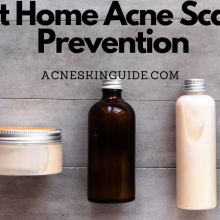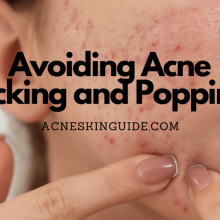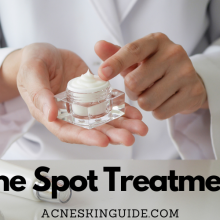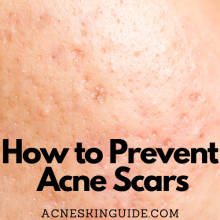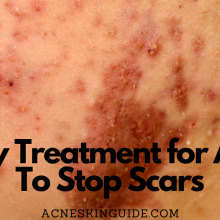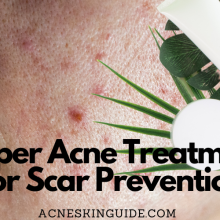Sunscreen To Prevent Acne Scars | Acne Skin Guide
Acne scars can be a lasting and frustrating reminder of previous acne, but the consistent use of sunscreen plays a crucial role in preventing further scarring and discoloration. Sun exposure can intensify existing reddish or brown marks, break down skin structure leading to atrophic scars, and cause abnormal pigmentation. Using a daily broad-spectrum, non-comedogenic sunscreen helps prevent new hyperpigmentation, protects existing scars from darkening, enhances the effectiveness of other treatments, and reduces abnormal pigmentation risk.
Choose water-resistant, photostable formulas and reapply every 2 hours in the sun. Complement sunscreen with other sun protection measures like shade, clothing, and checking the UV index. For severe, persistent scarring or pigmentation concerns, consult a dermatologist who can recommend treatments like laser resurfacing or fillers. With patience and consistent sunscreen use, acne scars can gradually fade and smooth over time.
#1 Recommended Acne Treatment | #2 Recommended Acne Treatment |
 |  |

Unmasking the Power of Sunscreen: The Essential Role in Preventing Acne Scar Worsening
Acne is a common skin condition that affects millions of people worldwide, and for many, the battle doesn’t end when the pimples clear up. Acne scarring can be a lasting reminder of the struggle, leaving behind indentations, raised marks, and discoloration that can significantly impact one’s appearance and self-esteem. While there are various treatments available for acne scarring, one often overlooked but crucial aspect of managing these scars is the use of sunscreen.
Understanding Acne Scars
Acne scars are the result of damage to the skin during the healing process of inflammatory acne lesions. When the skin doesn’t heal properly, it can lead to different types of scars:
- Atrophic scars: These are pitted or indented scars caused by a loss of collagen and tissue during the healing process.
- Hypertrophic scars: These are raised, thick scars that occur when the skin produces too much collagen during healing.
- Post-inflammatory hyperpigmentation: This is the discoloration or reddish/brown marks left behind after an inflammatory acne lesion has healed.
The Effects of Sun Exposure
While acne scars can be challenging to treat, sun exposure can further exacerbate their appearance. UV radiation from the sun can have several detrimental effects on acne scars:
- Intensifying discoloration: UV rays can darken existing reddish or brown marks, making them more noticeable and prominent.
- Breaking down skin structure: Sun exposure contributes to the breakdown of collagen and elastin, leading to further skin damage and accelerating the development of atrophic (pitted) scars.
- Abnormal pigmentation: After an inflammatory acne lesion, sun exposure can cause abnormal pigmentation, resulting in additional discoloration and uneven skin tone.
The Benefits of Sunscreen
Using a daily broad-spectrum sunscreen is crucial in preventing acne scars from worsening due to sun exposure. Here are some key benefits of incorporating sunscreen into your skincare routine:
- Prevention of hyperpigmentation: Sunscreen helps prevent new discoloration and hyperpigmentation from forming, allowing existing acne marks to gradually fade.
- Protection of existing scars: By shielding the skin from UV rays, sunscreen prevents existing acne scars from darkening or becoming more pronounced.
- Enhanced effectiveness of other treatments: Sunscreen can enhance the effects of other acne scar treatments, such as retinoids, chemical peels, and laser therapies, by protecting the skin from sun damage during the healing process.
- Reduced risk of abnormal pigmentation: Consistent sunscreen use reduces the risk of developing additional pigmentation issues, which can further complicate the appearance of acne scars.
Choosing the Right Sunscreen
When selecting a sunscreen for acne-prone or scarred skin, it’s essential to consider the following factors:
- Broad-spectrum protection: Look for a sunscreen that provides protection against both UVA and UVB rays, as both types of radiation can contribute to skin damage and hyperpigmentation.
- Non-comedogenic formula: For those with acne-prone skin, choose a non-comedogenic (non-pore-clogging) and oil-free sunscreen to avoid exacerbating breakouts.
- Physical or chemical filters: Physical sunscreens containing zinc oxide or titanium dioxide may be preferable for those with sensitive skin, as they sit on top of the skin and deflect UV rays. Chemical sunscreens, on the other hand, absorb UV rays and may be more prone to causing irritation.
- Water resistance and photostability: Look for sunscreens labeled as water-resistant and photostable, as these formulations are less likely to break down or become ineffective after extended sun exposure or perspiration.
Incorporating Sunscreen into Your Routine
To maximize the benefits of sunscreen for acne scars, it’s important to incorporate it into your daily skincare routine:
- Apply as the final step: After cleansing, applying any serums or treatments, and moisturizing, apply a generous amount of sunscreen as the final step in your morning routine.
- Reapplication: Reapply sunscreen every 2 hours when spending extended time outdoors or after sweating or swimming.
- Layering with other treatments: Sunscreen can be used in conjunction with other acne scar treatments, such as vitamin C serums, retinoids, and exfoliating products. Allow these treatments to fully absorb before applying sunscreen.
- Adjusting for skin tone: For those with darker skin tones, mineral-based sunscreens with tinted formulations may be preferable to avoid a white cast or ashy appearance.
Maximizing the Benefits
While sunscreen is an essential tool for managing acne scars, there are additional steps you can take to maximize its effectiveness:
- Consistency is key: Diligent daily use of sunscreen is crucial for seeing improvement in the appearance of acne scars over time. It may take several months to notice significant fading or smoothing.
- Complementary sun protection: In addition to sunscreen, seek shade when possible, wear sun-protective clothing and accessories like hats and sunglasses, and check the daily UV index to understand the intensity of sun exposure.
- Proper removal: At the end of the day, thoroughly remove sunscreen and any other skin care products to prevent clogged pores and potential breakouts.
- Address underlying acne: If you are still experiencing active acne breakouts, it’s important to address the underlying causes and manage the condition effectively to prevent further scarring.
Seeking Professional Advice
While sunscreen is an essential component of managing acne scars, some cases may require additional professional treatment. Consult a dermatologist if you experience:
- Severe or persistent scarring: If your acne scars are particularly severe or stubborn, a dermatologist can evaluate your skin and recommend appropriate treatments, such as laser resurfacing, dermabrasion, or fillers.
- Concerns about pigmentation changes: If you notice significant changes in pigmentation or discoloration that do not improve with sunscreen and other topical treatments, a dermatologist can assess the underlying cause and provide targeted therapy.
- Proper wound care: If you are actively dealing with acne lesions, a dermatologist can guide you on proper wound care techniques to minimize scarring during the healing process.
Potential Downsides of Sunscreen
While sunscreen is generally considered safe and beneficial for most individuals, there are a few potential downsides to be aware of:
- Skin irritation: Some sunscreen ingredients, particularly certain chemical filters, may cause irritation, redness, or allergic reactions in individuals with sensitive skin.
- Acne flare-ups: Certain sunscreen formulations, especially those that are comedogenic (pore-clogging), may contribute to or exacerbate existing acne breakouts.
- Environmental concerns: Some sunscreen ingredients, such as oxybenzone and octinoxate, have been linked to potential harm to marine ecosystems and coral reefs, prompting the need for more environmentally friendly alternatives.
To mitigate these potential downsides, it’s essential to choose a sunscreen formulation that is suitable for your skin type and concerns, and to consult with a dermatologist if you experience any adverse reactions or persistent acne flare-ups.
Conclusion
Acne scarring can be a frustrating and long-lasting consequence of severe acne, but the consistent use of a broad-spectrum, non-irritating sunscreen can play a crucial role in preventing further discoloration and worsening of existing scars. By incorporating sunscreen into your daily skincare routine, along with other treatments and sun protection measures, you can help acne scars gradually fade and smooth over time, restoring a more even and radiant complexion. Remember, patience and perseverance are key, as it may take several months to notice significant improvements. If you experience severe or persistent scarring or have concerns about pigmentation changes, don’t hesitate to seek professional advice from a dermatologist for personalized treatment recommendations.
#1 Recommended Acne Treatment | #2 Recommended Acne Treatment |
 |  |
Summary and FAQs
Can sunscreen alone prevent new acne scars from forming?
No, sunscreen alone cannot prevent new acne scars from forming. While sunscreen plays a crucial role in preventing existing acne scars from worsening and helping them fade, it is not a standalone solution for preventing new scar formation.
To minimize the risk of developing new acne scars, proper acne management is essential. This includes:
- Using appropriate acne medications: Following a prescribed treatment plan with topical or oral medications can help control breakouts and reduce inflammation, which is a major contributor to scarring.
- Avoiding picking or squeezing pimples: Picking, popping, or squeezing acne lesions can lead to further trauma to the skin and increase the likelihood of scarring.
- Maintaining a consistent skincare routine: Using gentle, non-comedogenic products and following a regular cleansing, exfoliating, and moisturizing routine can help keep pores clear and promote healthy skin renewal.
- Managing stress and hormone levels: Stress and hormonal imbalances can trigger or exacerbate acne breakouts, increasing the risk of scarring.
Sunscreen’s primary role in preventing acne scars is to protect existing scars from further discoloration and textural changes caused by UV exposure. It helps scars fade more evenly and smoothly, but it does not directly address the underlying causes of acne or prevent new lesions from forming and potentially leaving scars.
To effectively prevent new acne scars, a comprehensive approach combining appropriate acne treatment, gentle skincare practices, lifestyle modifications, and consistent sunscreen use is necessary. Sunscreen is an essential component, but it should be used in conjunction with other acne management strategies for optimal results.
Is there a specific SPF level recommended for acne-prone or scarred skin?
Yes, there are specific SPF level recommendations for individuals with acne-prone or scarred skin.
Most dermatologists recommend using a broad-spectrum sunscreen with an SPF (Sun Protection Factor) of 30 or higher for optimal protection against both UVA and UVB rays. However, for those with acne scars or concerns about hyperpigmentation, some experts suggest using a sunscreen with an SPF of 50 or higher.
Here are the general recommendations:
- For acne-prone skin:
An SPF of 30 or higher is typically recommended. Higher SPF levels provide better protection against UV-induced inflammation, which can trigger or worsen acne breakouts. - For acne scars or hyperpigmentation:
An SPF of 50 or higher is often advised. This level of protection is crucial for preventing further discoloration or darkening of acne scars and hyperpigmented areas due to UV exposure.
It’s important to note that no matter the SPF level, sunscreen should be applied liberally and evenly over the entire face and any other exposed areas of the skin. Reapplication is also necessary every two hours when outdoors or after sweating or swimming.
Additionally, broad-spectrum protection is essential, as both UVA and UVB rays can contribute to skin damage, inflammation, and pigmentation issues. Look for sunscreens labeled as “broad-spectrum” or containing ingredients that block both types of UV radiation.
While higher SPF levels can provide better protection, it’s also important to choose a sunscreen formulation that is non-comedogenic (non-pore-clogging) and suitable for acne-prone or sensitive skin. Physical or mineral sunscreens containing zinc oxide or titanium dioxide are often recommended for their gentler nature.
Ultimately, consistent and proper application of a broad-spectrum sunscreen with an SPF of at least 30 (or higher for acne scars and hyperpigmentation) is essential for individuals with acne-prone or scarred skin to prevent further damage and promote healing.
Can sunscreen be used on active acne lesions?
It is generally not recommended to apply sunscreen directly on open, oozing acne lesions or active wounds. There are a few reasons for this:
- Potential for trapping bacteria: Applying sunscreen or any topical product directly on an open lesion can trap bacteria and debris inside, increasing the risk of infection and potentially worsening the acne.
- Stinging or irritation: Many sunscreen formulations contain ingredients that can sting or cause irritation when applied to broken skin or open wounds.
- Interference with healing: Occlusion from sunscreen products can potentially disrupt the normal healing process of active acne lesions.
However, it is still important to protect the surrounding areas of the face from sun exposure while having active acne lesions. UV radiation can worsen inflammation, pigmentation, and scarring.
The recommended approach is:
- Avoid applying sunscreen directly on open acne lesions, cysts, or popped pimples that are oozing or have scabs.
- Apply sunscreen carefully around the active lesions, avoiding direct contact with the open areas.
- Use a gentle, non-irritating, and non-comedogenic (non-pore-clogging) sunscreen formulation, ideally mineral-based or formulated specifically for acne-prone skin.
- Be gentle when applying sunscreen, using clean fingers or a clean applicator to avoid further irritation or contamination of the lesions.
- Consider using other sun protection measures, such as wearing a wide-brimmed hat or seeking shade, during times of active acne breakouts.
Once the acne lesions have fully healed and the skin has closed over, it is safe to resume regular sunscreen application over those areas to protect against further sun damage and potential scarring.
Consulting a dermatologist can also provide personalized guidance on sunscreen use and proper wound care for active acne lesions to minimize the risk of scarring while protecting the surrounding skin from UV exposure.
How long does it take for sunscreen to help improve the appearance of acne scars?
The time it takes for sunscreen to visibly improve the appearance of acne scars can vary greatly depending on several factors. In general, it may take several weeks or even months of consistent sunscreen use to notice a significant improvement in the fading of discoloration and the smoothing of textural irregularities.
Here are some key points regarding the timeline for acne scar improvement with sunscreen use:
- Severity of scarring: More severe or deeply pitted acne scars may take longer to show noticeable improvement compared to shallower or discolored scars.
- Type of scarring: Hyperpigmented or discolored scars may begin to fade more quickly with sunscreen use, while indented or atrophic scars may take longer to see textural smoothing.
- Individual skin type: Skin types that are more prone to hyperpigmentation or have slower cell turnover may experience slower improvement compared to those with quicker skin renewal cycles.
- Consistency of sunscreen application: Diligent, daily application of sunscreen is crucial for seeing optimal results. Inconsistent or sporadic use may delay the improvement process.
- Other treatments used: The use of additional scar treatments, such as retinoids, chemical peels, or laser therapies, in conjunction with sunscreen, can accelerate the improvement process.
Generally speaking, most individuals may begin to notice some fading of discoloration or redness within 4-8 weeks of consistent sunscreen use. However, significant smoothing of textural irregularities and indentations may take 3-6 months or longer, especially for more severe scarring.
It’s important to manage expectations and understand that acne scar improvement is a gradual process that requires patience and persistence. While sunscreen plays a vital role in preventing further discoloration and damage, complete scar resolution may require additional treatments or professional intervention in some cases.
Consulting with a dermatologist can provide personalized guidance on realistic timelines and the most effective treatment plan for your specific type and severity of acne scarring.
Can certain sunscreen ingredients worsen acne or acne scarring?
Yes, certain sunscreen ingredients can potentially worsen acne or contribute to acne scarring in some individuals. Here are some common sunscreen ingredients that may cause issues for those with acne-prone or scarred skin:
- Chemical filters:
Some chemical UV filters like oxybenzone, avobenzone, and octinoxate have been associated with increased risk of skin irritation, clogged pores, and acne flare-ups in those with sensitive or acne-prone skin. - Oils and emollients:
Sunscreens containing heavy oils, butters, or emollients like mineral oil, coconut oil, or isopropyl palmitate can clog pores and exacerbate acne breakouts. - Fragrance:
Fragrances and added perfumes in sunscreen formulations can potentially irritate and inflame acne-prone skin, leading to increased scarring. - Preservatives:
Certain preservatives like parabens, formaldehyde-releasing agents, and phenoxyethanol have been linked to skin irritation and potential acne triggers in some individuals.
On the other hand, physical or mineral sunscreens containing zinc oxide and titanium dioxide are generally considered safer options for those with acne-prone or scarred skin. These ingredients sit on top of the skin and deflect UV rays rather than being absorbed, reducing the risk of clogging pores or causing irritation.
It’s crucial to read the ingredient labels carefully and opt for non-comedogenic (non-pore-clogging) and oil-free sunscreen formulations specifically designed for acne-prone or sensitive skin. Patch testing a small area before applying all over the face can also help identify any potential reactions or irritation.
If you notice increased breakouts, redness, or irritation after using a particular sunscreen, discontinue use and consult with a dermatologist to find a more suitable alternative that won’t exacerbate your acne or worsen scarring.
Additionally, proper cleansing and removal of sunscreen at the end of the day are essential to prevent clogged pores and potential acne flare-ups.

